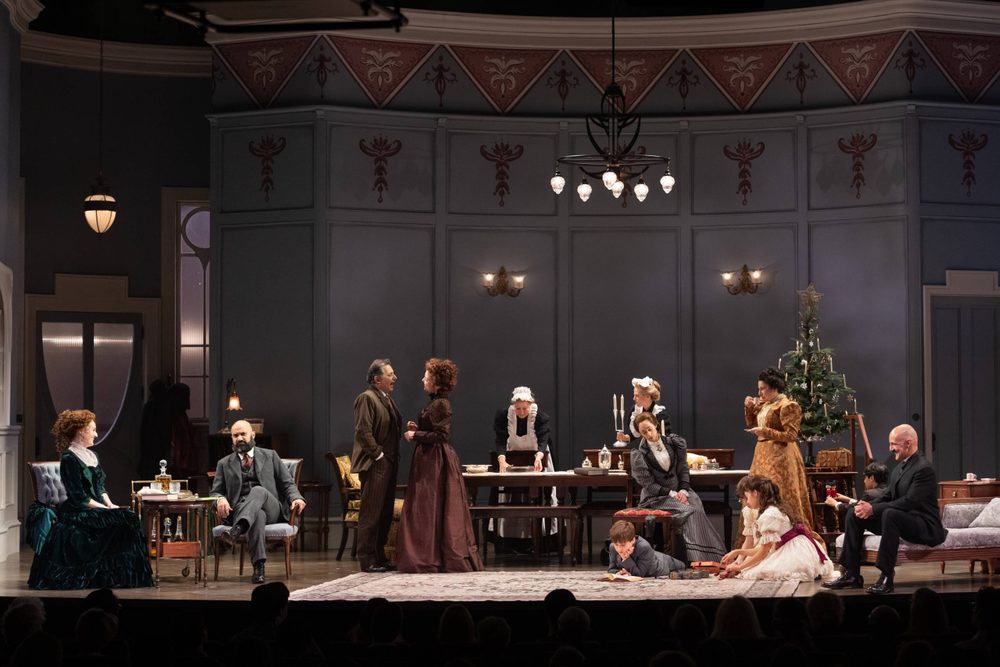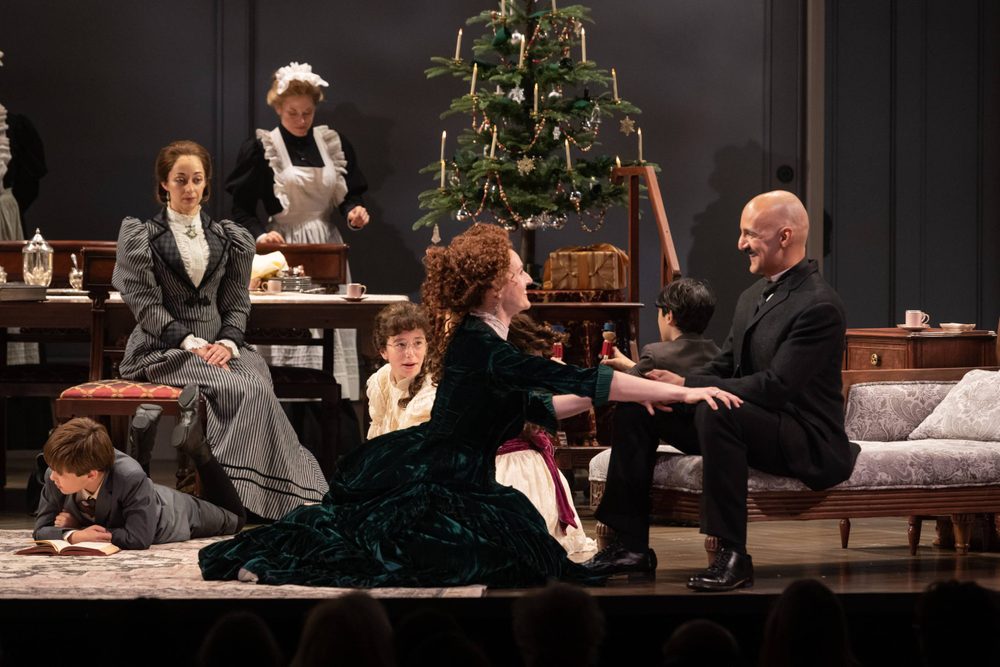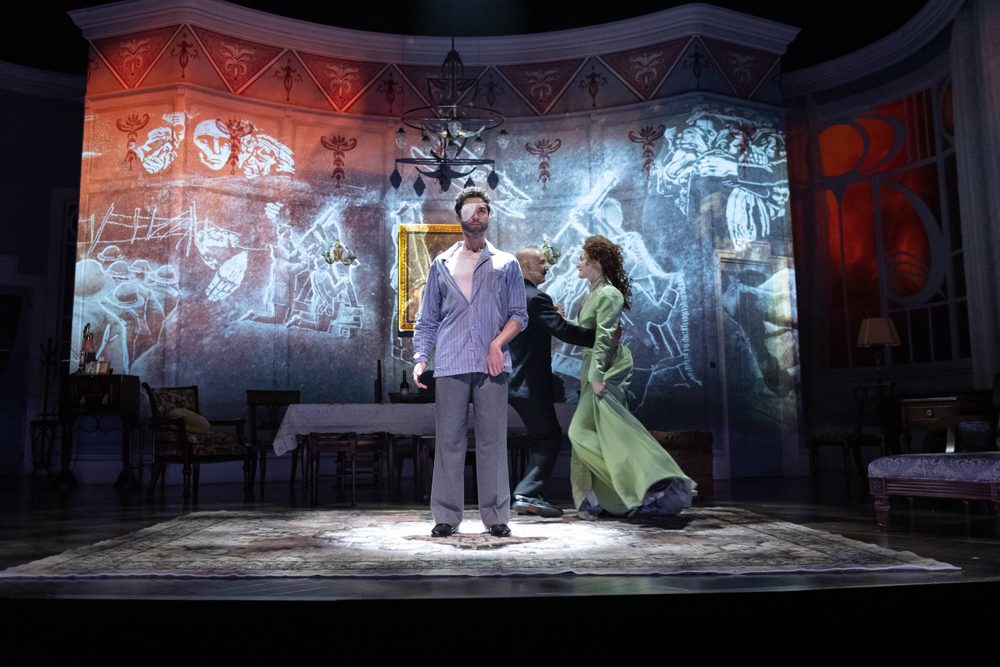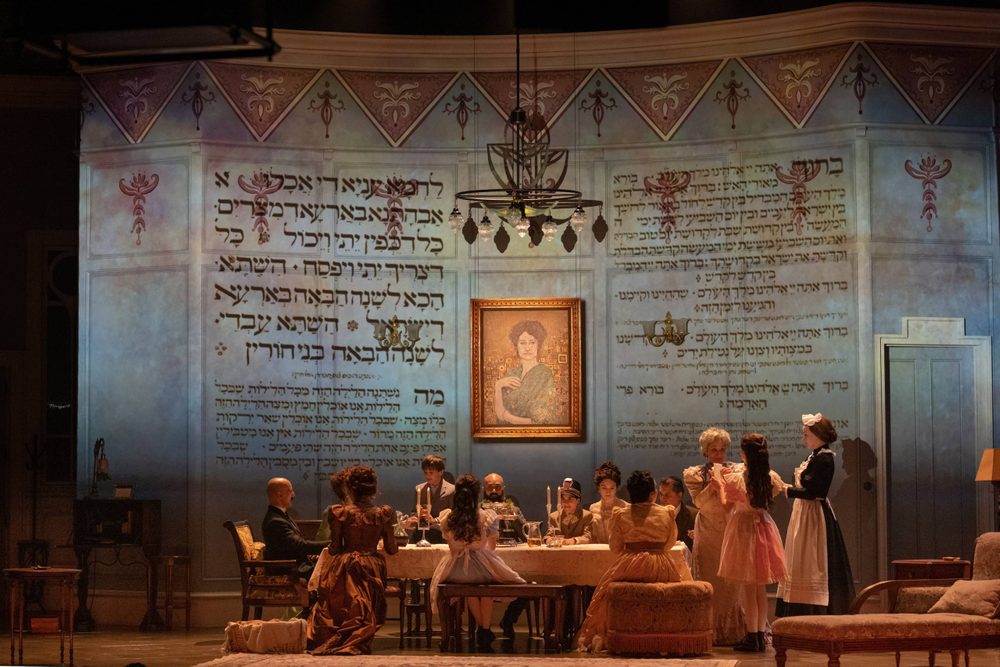
‘Leopoldstadt’ – Play by Tom Stoppard. Directed by Carey Perloff. Scenic Design by Ken MacDonald; Costume design by Alex Jaeger; Original Music and Sound Design by Jane Shaw; Lighting Design by Robert Wierzel; Projection Design by Yuki Izumihara. Presented by The Huntington in association with Shakespeare Theatre Company at the Huntington Theatre, 264 Huntington Ave., Boston, through Oct. 13.
By Mike Hoban
As members of any marginalized group trying to integrate into an established community can tell you from firsthand experience, assimilation doesn’t necessarily mean acceptance. The sad truth is that all too often, money, education, physical attributes, or achievement cannot overcome the deep-rooted prejudices of those who cling to the privilege of their skin color, religion, or nationality. Just ask the Obamas.
That’s the dominant theme of Tom Stoppard’s Leopoldstadt, now playing at the Huntington. The play follows multiple generations of the fictional Jewish Merz and Jacobowitz families in Vienna, beginning at the turn of the 20th century and proceeding with scenes set in 1924, on Kristallnacht in 1938, and in 1955 when the horrors of the Holocaust were still smoldering in the minds of the affected populace. Though not autobiographical, much of the play reflects the experiences of Stoppard’s family (although a character that is clearly him appears in the final scene). Stoppard didn’t learn of his Jewish heritage until he was in his fifties. All four of his Czechoslovakian grandparents, as well as numerous other family members, died in the Holocaust, and his family fled to Singapore to escape the Nazis in 1938 when he was an infant. His father passed, and his mother remarried a man named Stoppard, who moved them to England, and he grew up blissfully unaware of his past.

The play opens with the mixed-faith families celebrating Christmas. Jacob, son of factory owner Hermann (Nael Nacer), innocently affixes a Star of David to the top of the Christmas tree before being corrected and given a more traditional one. “Poor boy, baptized and circumcised in the same week, what can you expect?” says his grandmother Emilia (Phyllis Kay). That’s when we learn that Hermann converted from Judaism to Catholicism and later married Gretl (Brenda Meaney), his gentile wife. As he distances himself from his heritage, he convinces himself that his wealth and social standing will protect him from the (inevitable) oppression and persecution that his ancestors were subjected to – even as he acknowledges the ample evidence of antisemitism in his everyday life. “We’re the torchbearers of assimilation,” he declares to his brother-in-law Ludwig (Firdous Bamji), who responds by reminding him that the Jews are hated by the Poles, the Germans, and the Czechs. “A Jew can be a great composer. He can be the toast of the town, but he can’t not be a Jew,” he says. “In the end, if it doesn’t catch up on him, it will catch up on his children.” Decades pass, and Ludwig’s words come to pass. The delusion is smashed, quite literally, on Kristallnacht when the family is stripped of its home and assets. The final stake is driven into the heart of his fantasy during the gruesome epilogue, hauntingly delivered in the final scene by Freudian psychoanalyst Rosa (Rebecca Gibel), Ludwig’s niece, and it’s devastating.

The play also explores the impact of infidelity, family dynamics, and the devastation of war as we witness the immense emotional and physical toll on Jacob (Mishka Yarovoy), who inherits the family business. Despite its weighty themes, there’s a lot of humor in Leopoldstadt, especially in the early going. As the matriarch Emilia, Phyllis Kay is a veritable punchline machine, and there’s a scene involving a bris (the Jewish ceremony in which a baby boy is circumcised) – where Hermann’s banker is mistaken for the doctor – that would fit seamlessly into a classic Seinfeld episode.
Most of the play occurs in the grand, high-ceilinged living room, and Ken MacDonald’s set design effectively conveys the lavish lifestyle of the Merz family. The rear wall also serves as a backdrop for the superb projection work of Yuki Izumihara, which provides everything from the Hebrew text during the Passover scene to a montage of action footage from the wars and other events. The original music and sound design by Jane Shaw enhance the action beautifully, and the transition music between scenes evokes classic 30’s and 40’s movies.

Leopoldstadt is enormously compelling theater, and the cast’s performances are uniformly solid, but the problem with the cast lies in its sheer numbers. There are 15 adult actors and four child actors sharing multiple roles in the two-hour and twenty-minute production, so it can be confusing to keep not only the characters straight but also their relation to other cast members. (One wonders if the story might be better served as a limited Netflix series.) It is also worth noting that the material is much easier to put in context if you have an understanding of 20th-century European/German history.
That being said, Leopoldstadt is an undeniably important and powerful work, and it may well be Stoppard’s last, given his advanced age (87). And with the meteoric rise of antisemitism around the globe and in the U.S., it couldn’t be more timely. For more information and tickets, go to: www.huntingtontheatre.org

